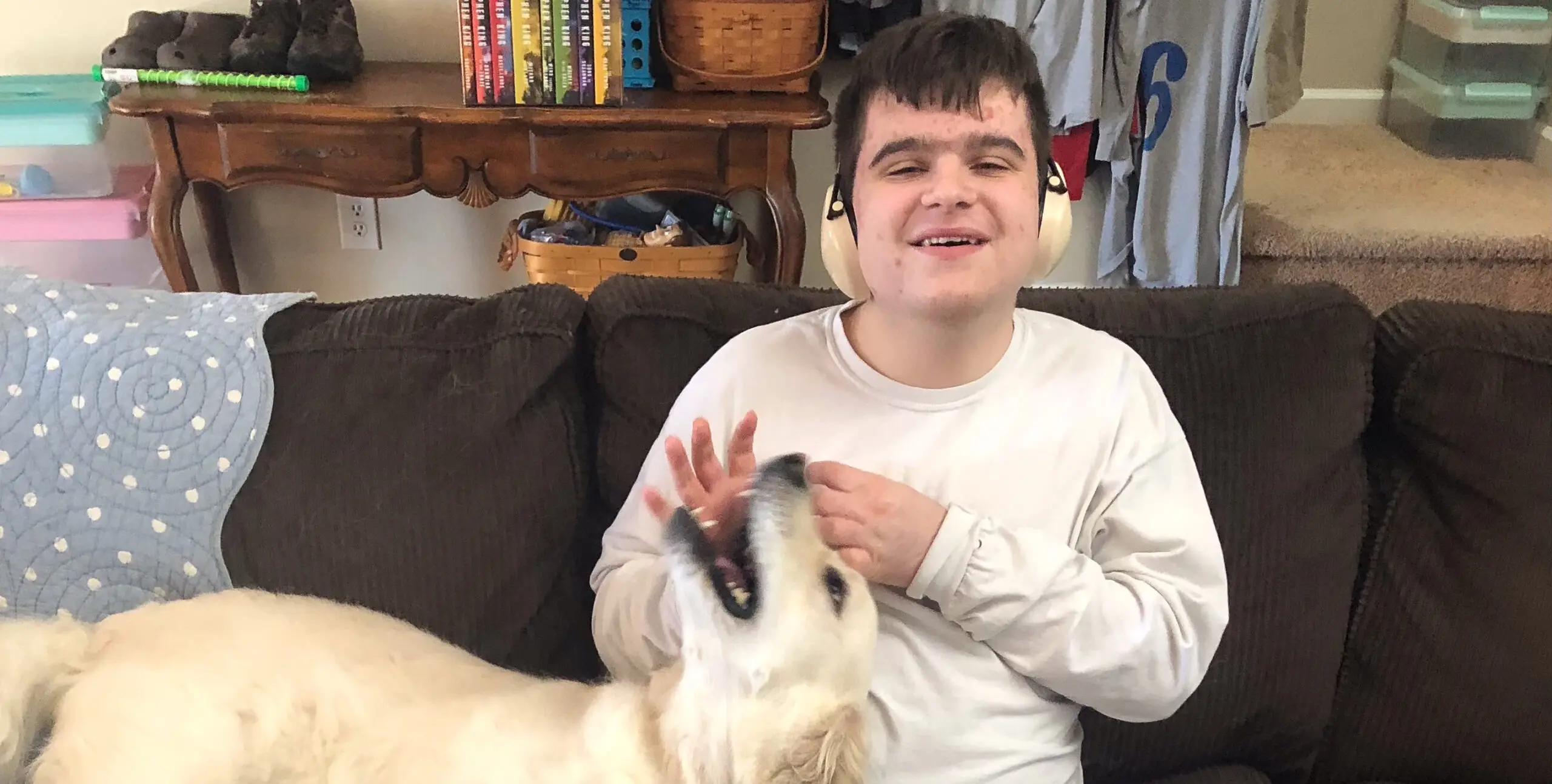By Sharon Mager
Through the past two decades, BCM/D Executive Director Tom Stolle has candidly poured his heart out about the journey he and his wife, Shelley, have been on with their 21-year-old son Jimmy, who is affected by severe autism. God has used Tom’s willingness to share, sometimes with tears, to start a disability ministry initiative in Maryland/Delaware — perhaps you could call it a revolution. Those in neurotypical families started to open their eyes and see the needs around them as they began to comprehend Tom and Shelley’s struggles coping with the emotional and physical demands at times extreme, of taking care of a child affected by disabilities.
As Jimmy grew, Tom began to advocate for families affected by disabilities, whom he says together make up the largest unreached people group in the world. He struggles not to break down when he talks about the large percentages of sexual abuse in the disability community and the likelihood of Jimmy being one of those statistics. Above all, Tom emphasizes presenting the gospel to people affected by disabilities.
And many listened and responded.
Maryland/Delaware churches began considering the possibilities and even starting disabilities ministries, hosting or participating in Tim Tebow Night to Shine proms for people affected by disabilities, and attending BCM/D conferences and camps for families with these needs. Tom’s passion, which is
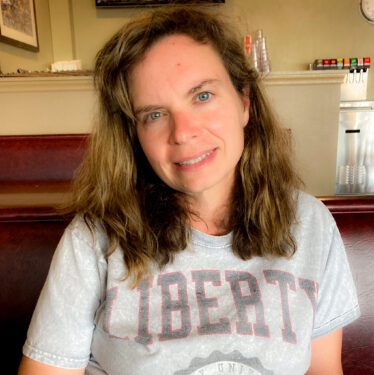
Shelley Stolle says, “I know Jimmy loves us and appreciates us. I know that’s coming from God.” (Photo courtesy of Stolle family)
contagious as many caught the vision, was also instrumental in the creation of The Banquet Network, which exists to help churches start and strengthen their disability ministries.
It is an exciting initiative, and it’s still growing.
BaptistLIFE wanted to hear more about this journey from Shelley Stolle, and she was gracious in sharing some of her personal life, her struggles, and God’s mercy.
Diagnosis
Shelley chuckles and says she’s not quite as outgoing as Tom. She’s actually a little shy. But it quickly becomes evident that she’s strong, resilient, and a woman of deep faith.
Even over a Zoom meeting, the emotion and Shelley’s love for her family shines through.
Sharing the moments two decades ago when Shelley discovered her youngest child was affected by autism, she said, “It was traumatic. We knew something was going on. He had unusual movements and wasn’t playing with toys like other children.”
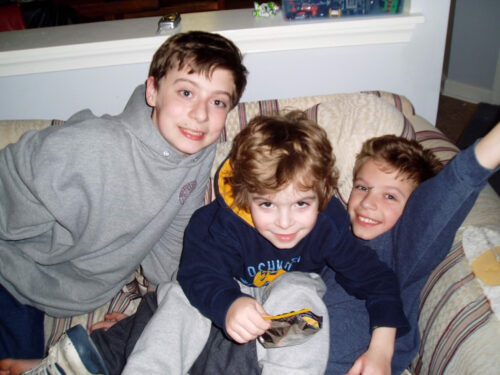
Brothers Jordan (JT), Jimmy and Jacob (Jake) enjoyed playing together. (Photo courtesy of the Stolle family)
While on vacation, Shelley’s sister, Kim, gently told Shelley and Tom she was concerned about Jimmy. She had seen autism before, and Jimmy was manifesting those symptoms. That was hard to hear, hard to accept.
After an official diagnosis, Shelley and Tom were crushed.
“I didn’t tell anyone at first. I cried. I was worried for Jimmy, and I was in a kind of mourning for the life I thought he’d have.”
After the shock and while still coping with grief, Shelley threw herself into learning everything she could about autism. “I read every book I could find. It was definitely a hard time,” she said.
Asked about how she handled the situation spiritually, Shelley said she didn’t fall apart and turn FROM God. She turned TO Him. “I knew I could trust God. Jimmy belongs to Him anyway. It helped me. I don’t think I was angry. I was more scared. I kept reminding myself that God has Jimmy.”
Shelley admits she’s still nervous, even today, afraid that something will happen to him when they’re not around. “It’s impossible for me not to worry. I can stress out over everything, but I know, deep down, God still has this. I feel that peace. You know He’s there, and you’ll work through it.”
During the interview, Jimmy was hungry and made a few sounds behind Shelley. She smiled lovingly at him, then turned back and said he wanted something to eat. So she talked as she searched cabinets for a snack.
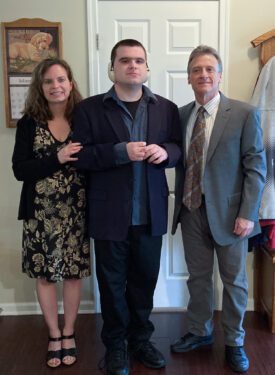
Shelley, Jimmy, and Tom Stolle are preparing to head to “Night to Shine” prom for individuals with disabilities. (Photo courtesy of the Stolle family)
Asked about how her other sons, Jake and J.T., reacted to the news about Jimmy’s diagnoses, Shelley said, “They were sad. They feel bad he doesn’t have it as easy as they do.” She said the older boys, now men, have always been supportive and gone out of their way to help their younger sibling and care for him. And they are humble. “They never made us feel bad that Jimmy gets more attention. They understand, and they love him unconditionally.”
Regarding her and Tom’s relationship, they’re amazingly good. The intense schedule and challenges in families with disabilities pull many couples apart. In a 2023 Psychology Today article titled “Divorce and Special Needs Children,” Author Ann Gold Busch writes that surveys show that in families that include a child with disabilities, the divorce rate is up to 87%.
But not so with Shelley and Tom. “As parents and partners, we have been closer – we had to, especially when Jimmy had behavior issues and was being aggressive. It was very stressful. I don’t think we ever took it out on each other. It has made us better partners. Our schedules are down to the minute. Everything we have to do; we take care of it. We support each other, and we’ve both grown a lot because of what we’ve been through.”
The Challenges of Attending Church
Going anywhere can be tricky unless it’s heading out to get some of Jimmy’s favorite pepperoni pizza at Nicola Pizza in Lewes, Delaware. Some places are extremely challenging, like the dentist. Even going to church used to be very hard, but it’s better today.
Shelley said most people were comfortable with their family attending church, but not all. “We saw glimpses of what it was like for others in our situation, especially if they didn’t have the support.
 When Jimmy was younger, he was cute and adorable, but they worried about when he was older and may not be considered so adorable, but they’ve been pleasantly surprised. There are still issues at times, but for the most part, she said, people want to help.
When Jimmy was younger, he was cute and adorable, but they worried about when he was older and may not be considered so adorable, but they’ve been pleasantly surprised. There are still issues at times, but for the most part, she said, people want to help.
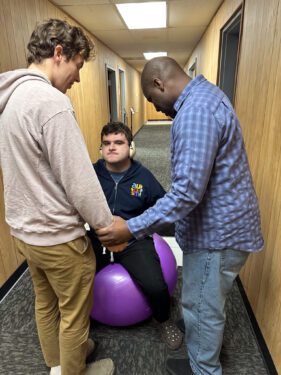
Buddies Josh Kline and Mario Howard pray with Jimmy at the Stolle’s home church, High Tide. (Photo courtesy of the Stolle family)
 Shelley said Tom began thinking about how others faced similar difficulties. Shelley said, “Tom had a desire to help others all over. He couldn’t stop thinking about it.” He continued praying, researching and talking about it. And he wasn’t alone. Shelley said they began to see God raising up others who were passionate about helping those with disabilities in the church, including Tim Tebow, whose “Night to Shine” proms for those with disabilities were, as Shelley said, “Just exploding.”
Shelley said Tom began thinking about how others faced similar difficulties. Shelley said, “Tom had a desire to help others all over. He couldn’t stop thinking about it.” He continued praying, researching and talking about it. And he wasn’t alone. Shelley said they began to see God raising up others who were passionate about helping those with disabilities in the church, including Tim Tebow, whose “Night to Shine” proms for those with disabilities were, as Shelley said, “Just exploding.”
“God was bringing people to help families that needed to be able to worship and needed these experiences. People who have children with disabilities need to go to church. We definitely need support.”
The Stolles get solid support at their home church, High Tide Church in Dagsboro, Delaware. Several men in the congregation have stepped up to be “buddies,” ministering to Jimmy on Sundays. As Jimmy sits on a big yoga ball and bounces a basketball back and forth to the leaders, the men share Bible stories with him and pray for him.
“Sitting in church service and hearing the service is really important. For a while, I wasn’t getting to do that. I’d hear bits and pieces because Jimmy needed breaks.” But letting go and having others care for Jimmy took a while.
Ray Jenkins, one of the original buddies, said he and another buddy, Mario Howard, would grin when they’d catch Tom peeking out around the corner, keeping an eye out. Hearing about that, Shelley laughed and said that was her sending Tom out to check on Jimmy. Shelley admitted. “It wasn’t easy.” She was worried that Jimmy would have a need and the others wouldn’t understand. “We worked up to it, but now I can sit in a church service the whole time. It’s great for us.”
God Speaks Jimmy
How does Jimmy, who is non-verbal, respond to the love and sharing of the gospel? Shelley said, “He responds the way he can.” Jimmy knows people love and care for him.
 “One day, Ray Jenkins said he wanted to join us for a ‘Jimmy outing.’ We were in a Cracker Barrel. At first, Jimmy didn’t see Ray, but when he did, he got so excited and ran over to him and hung on to him. Every emotion for Jimmy is real. Ray was so overwhelmed at how loving and real Jimmy was.” Shelley said Jimmy appreciates the time Ray and Mario, and others have fun with him and tell him Bible stories. “I think Jimmy knows they care for him.” Shelley said Jimmy experiences God through his experiences at the church and through her, Tom, and the family.
“One day, Ray Jenkins said he wanted to join us for a ‘Jimmy outing.’ We were in a Cracker Barrel. At first, Jimmy didn’t see Ray, but when he did, he got so excited and ran over to him and hung on to him. Every emotion for Jimmy is real. Ray was so overwhelmed at how loving and real Jimmy was.” Shelley said Jimmy appreciates the time Ray and Mario, and others have fun with him and tell him Bible stories. “I think Jimmy knows they care for him.” Shelley said Jimmy experiences God through his experiences at the church and through her, Tom, and the family.
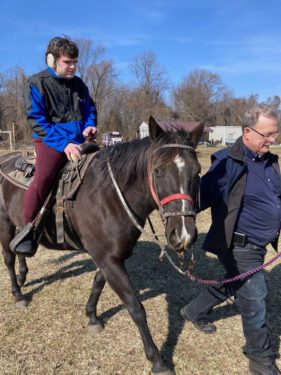
One of Jimmy’s favorite pastimes is riding on his favorite horse at the home of Pleasant View Baptist Church Pastor Harold Phillips. (Photo courtesy of the Stolle family)
“I think just the way he responds to our love is a way he responds to God’s love. We never gave up on him when we were having difficult times. I know Jimmy loves us and appreciates us. I know that’s coming from God. There’s so much going on in his little brain and body. The way he responds in love, I know He feels it. He can’t tell us if he can understand the gospel. But I know God loves him, and Jesus loves him. I know it’s there.”
“Every night before we go to bed, I tell Jimmy I love him. I kiss him and tell him Jesus and l love him. Every time we can, we try to show him love the way God loves us. I know I could never show the same love, but I try.”
Don’t be Afraid
Looking at the future of disability ministry, Shelley said she’d like to see it more widespread.
She encourages others, “Be kind and understanding. Remember, we deal with it all the time. We need understanding and love. If Jimmy or another person with a disability makes a sound in a room, so what?”
She said, “Churches sometimes are set on ‘This is how it has to look,’ but sometimes, it might have to look a little different with people with disabilities there. Just a little bit different might help these people be a part of the church
“Don’t be afraid. Don’t let the little things bother you.”
The BCM/D is thrilled to announce our inaugural Disability Sunday on July 14. We invite you to join us in raising awareness and support for individuals and families with disabilities. More information will be available to help your church observe this special day.


